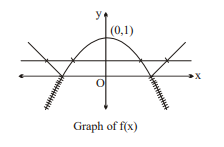Q.
An even polynomial function $f (x)$ satisfies a relation
$f(2 x)\left(1-f\left(\frac{1}{2 x}\right)\right)+f\left(16 x^2 y\right)=f(-2)-f(4 x y) \forall x, y \in R-\{0\}$ and $f(4)=-255, f(0)=1$Which of the following hold(s) good?
Application of Derivatives
Solution:
